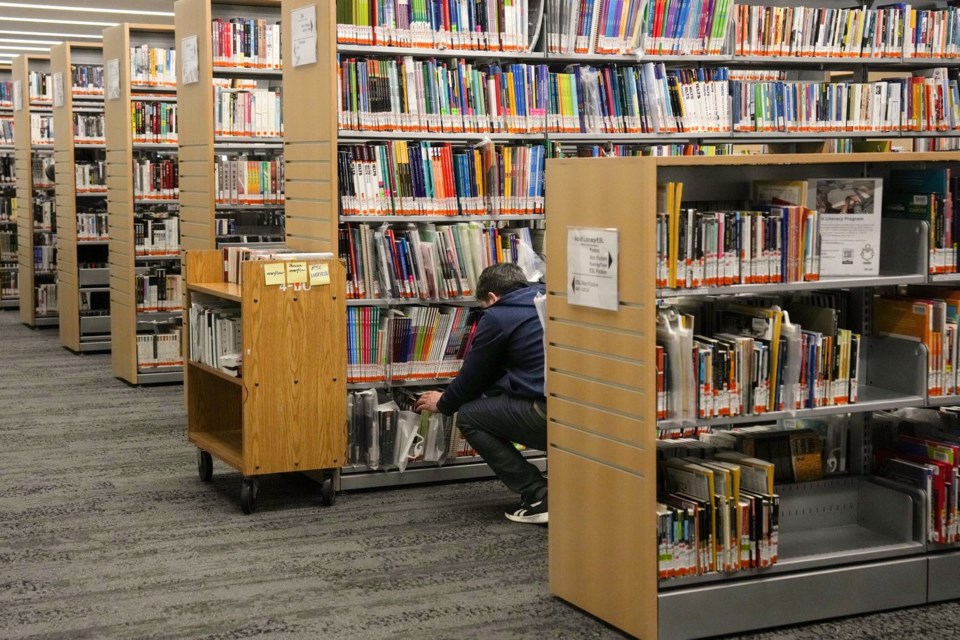TORONTO — Canada's literary institutions are banding together on the eve of an expected announcement about counter-tariffs on U.S. imports that could include books.
Booksellers big and small, libraries and publishers are advocating for books to be left off the list of American-made items subject to tariffs from the Canadian government, saying such a move would devastate the industry and restrict the open flow of information.
While many Canadian-owned publishers print their books domestically, the majority of books sold here are imported from the U.S., said Jack Illingworth, executive director of the Association of Canadian Publishers.
"A tariff will drive up either the cost (booksellers) charge their consumers or reduce their profit margin," Illingworth said.
"And I know they're finding both options equally untenable. There simply isn't enough of a profit margin on books for the bookselling industry to eat that kind of a loss. And books are also a very price-sensitive product."
U.S. President Donald Trump has pledged to impose "reciprocal" tariffs Wednesday by increasing U.S. duties to match the tax rates other countries charge on American imports.
It's not yet clear what the latest levies could mean for Canada and whether Trump will end a temporary pause on economy-wide tariffs on the same day, but Prime Minister Mark Carney has indicated Canada will respond with tariffs of its own.
A notice of intent to impose counter-tariffs on U.S. goods lists books as one possibility. The Department of Finance has said it is accepting industry input about the proposals until Wednesday.
In an email, a spokesman for the department said "all submissions received will be given careful consideration" but didn't provide details about when a decision would come down.
The books industry has been lobbying the government for an exemption for weeks, but Illingworth said the finance department has stayed mum about their plans.
In Illingworth's 25 years in the industry, the price of a trade paperback hasn't increased at the rate one would expect, he said, but that could change if Canada slaps a levy on American imports.
"Books just haven't been subject to inflation in the way other goods have been. And I think that's reflective very much of the price that retailers want to sell them at and that consumers feel they should pay."
A new report from BookNet Canada, which compiled data from more than 2,700 bookstore locations — representing roughly 85 per cent of book industry sales — found Canadian-owned publishers, who mostly print domestically, made up 5.6 per cent of book unit sales in 2024.
The rest came from internationally owned publishers such as Penguin Random House Canada and HarperCollins Canada, many of which would be affected by Canadian tariffs.
Illingworth added Canadian books and other cultural goods are not currently subject to U.S. tariffs, but Congress could change that if Canada imposes its own levy on book imports.
"We don't want to provoke a retaliatory situation where that happens," he said.
"Canada has a long-standing policy going back decades of keeping culture off the table in trade wars and trade negotiations," he said.
He said that is part of what allows Canada to regulate its cultural industries.
"It's what allows us to support them and essentially to make sure that we still have independent book, music, film, TV sectors that exists separate from the global mega-corporations that exist on our border," he said.
Drew Fagan, a professor at the University of Toronto's Munk School of Global Affairs and Public Policy, said that principle dates back to a carve-out in the original North American Free Trade Agreement meant to protect Canada's cultural identity.
The U.S. has long questioned why Canada treats its cultural goods with such sensitivity, he said, and if Canada slaps tariffs on American cultural products, it could jeopardize that argument going forward.
"I would hope that given the degree to which Ottawa is thinking strategically of where they would apply counter tariffs that they would think twice about this," Fagan said.
Meanwhile a joint letter to Carney from the Canadian Independent Booksellers Association and Indigo Inc. CEO Heather Reisman says the effects of these tariffs would be "devastating."
"At this time there is nowhere near the capacity in Canada to handle all of our printing and warehousing. This tariff threatens the survival of bookstores and the livelihoods of thousands of Canadians," the letter reads.
The Canadian Urban Libraries Council also called on the government to exempt books.
"A 25 per cent tariff on U.S.-manufactured materials would collectively cost Canadian libraries millions of dollars and represent at minimum a 10 per cent reduction to budgets that are already under pressure," CULC Executive Director Mary Chevreau wrote in a letter to the Department of Finance.
"These costs are ultimately borne by Canadians, either through increased taxes or reduced access."
This report by The Canadian Press was first published April 1, 2025.
Nicole Thompson, The Canadian Press



